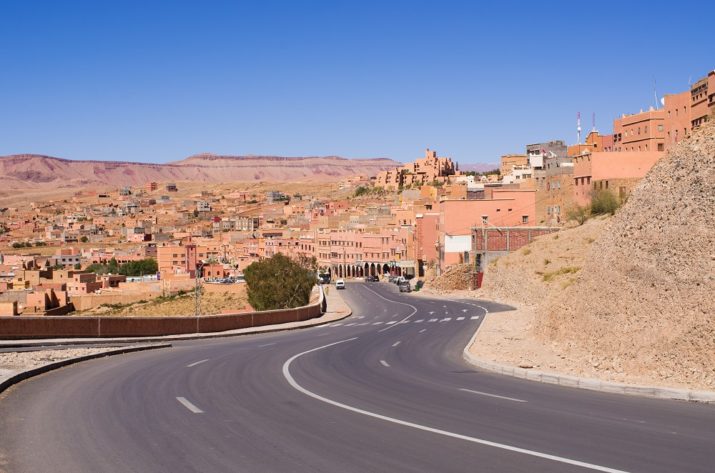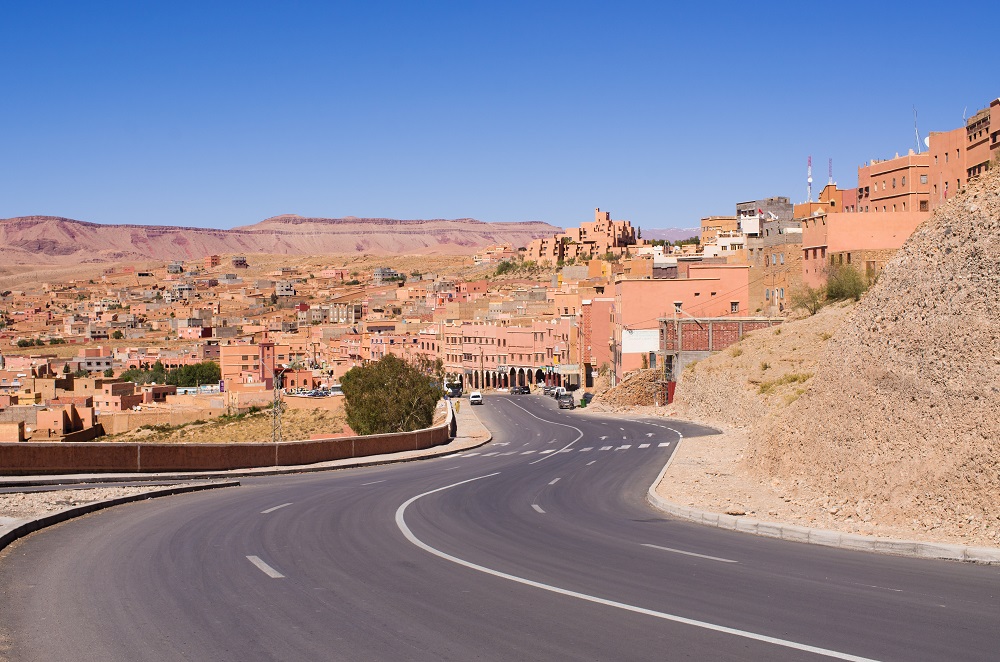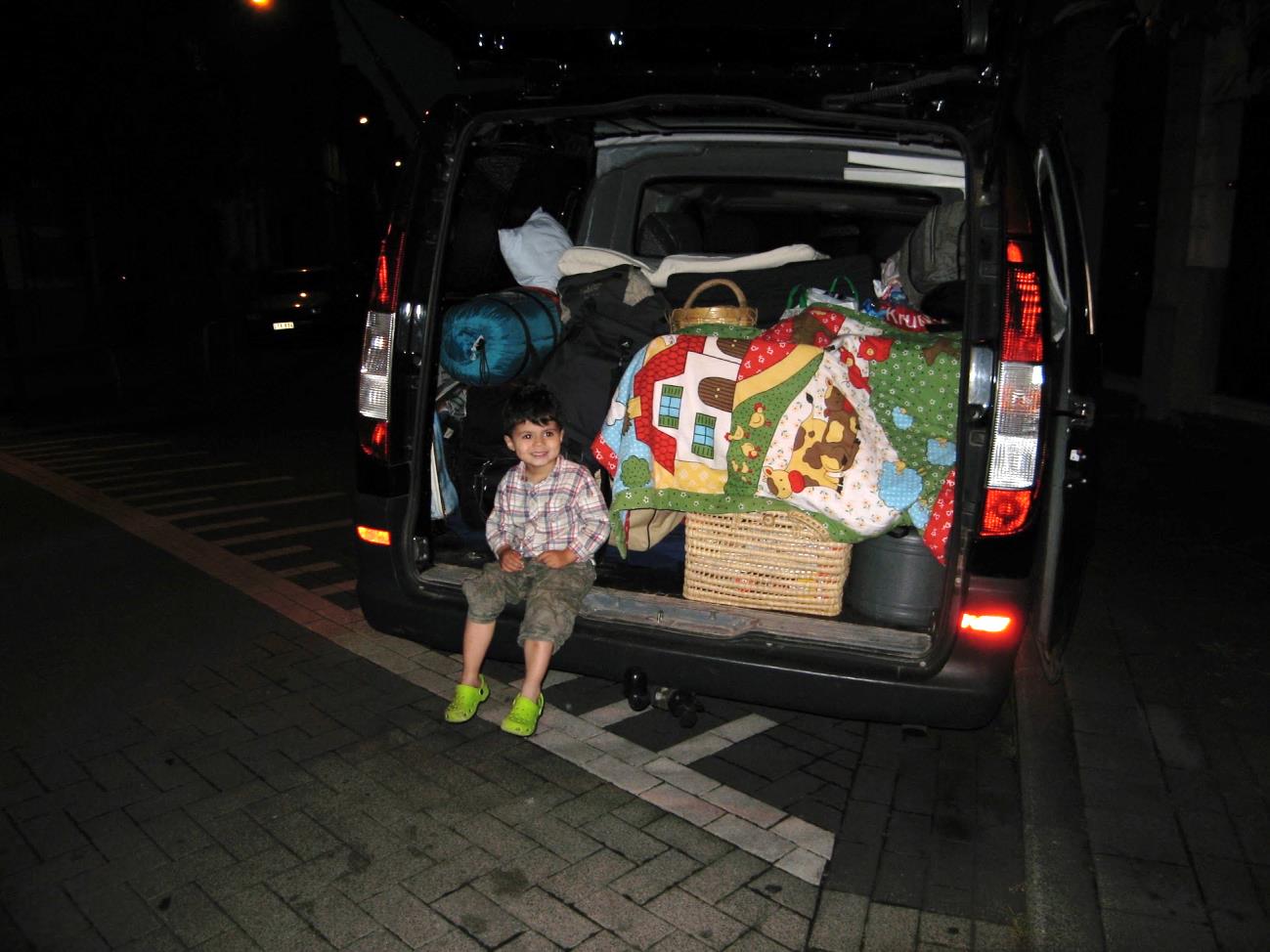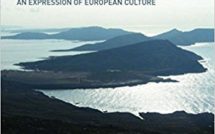

This is part of our special feature on Tourism: People, Places & Mobilities.
This set of research notes illustrates how the annual vacation of diasporic European-Moroccan communities towards Morocco carves a “Moroccan” road in their trajectory through Europe. By embracing this practice as a materialization of affect, we can appreciate the infrastructure of the road as more than a space of transit: it also becomes a site for the effective trope of insha’allah, encompassing a spontaneous, frenetic excitement associated with this holiday practice. The road and its affective atmospheres become relationally entangled, producing each other and enabling this journey to perpetuate over generations of Moroccan-origin citizens of Europe.
Holiday departure
It’s already time for the holiday. This afternoon, I saw the Alis leave for Morocco. They have a huge red van and every year they drive through France and Spain to return to the bled and spend two months there. I watched them from my window. They took at least an hour to get ready. The kids were all dressed up. You could read on their faces the happiness and excitement to leave. I envied them. In any case, they brought a ton of luggage. Three-quarters of the bags must have been full of presents for the family, friends and neighbors. It always happens like that. The mother even brought a vacuum cleaner. Latest model Rowenta. She’ll go nuts with it there.
(Guène 2004: 105, translated by author)
Interview extract: We don’t plan
| Otman B, Antwerp, 25 March 2008, 50sec | ||
| 1 | LW | um (.3) are you going this year? or do you kn[ow- |
| 2 | O | [inša’allah, inša’allah/ (.) inša’allah. |
| 3 | LW | °yeah° always right up to the day, righ=hhh=t, .h hheheh[ehheh (.3) who gets in the car and who doesn’t |
| 4 | O | [yeah:: w- we don’t- we don’t plan e- yeah/ we don’t plan thin- things like eh: that’s eh difference between (.) us and (1.2) eh::: Europeans, lik#e (.8) they plan things, like/ four five months ahead, #(.8) we do that like/ two days befo=hhh=re=hh=we=hhh # (.) go, so::/ |
| 5 | LW | yeah. I know/ this is my problem now tsseeh[hh |
| 6 | O | [yeah? hheheh[hh= |
| 7 | LW | [yeah. (.5) ye[ah |
| 8 | O | [=that’s- but (1.8) eventually (.) those are the best eh:::::: vacations, [for me/ I mean like/ something that we do: on the spot#. then it begins like eh:: (.8) that’s the best vacatio#n/ if we do something we plan ahead # (.7), then it do-::: it (.) it doesn’t work out #/ no. doesn’t work out. # |
| 9 | LW | [mmm mmm |
The above accounts, the first from the novel Kiffe kiffe demain by Faiza Guène and the second from a research interview with Otman (Wagner 2011), evoke the pervasive effective atmosphere of the European summer holiday exodus to Morocco. In Guène’s portrait, through the eyes of an Algerian-origin French teenager in a Paris banlieue, the loading up of cars is a source of jealousy and longing for the pleasure of the holiday, as her own family is unable to travel. Otman, as a Moroccan-origin Belgian who makes the trip with his extended family nearly every year, describes his excitement about the uncertainty and anticipation of going on holiday through insha’allah spontaneity, which produces, he claims, the best vacation. While these holidays to return to a diasporic “home” are often researched and analyzed through the symbolic and social importance of visiting family and maintaining ties to ancestral origins, my project illustrates how the affective atmosphere of leisure, pleasure, and excitement plays a vital role in the perpetuation of the summer trip “home” (Bidet and Wagner 2012; L. Wagner and Minca 2012; L. Wagner 2008, 2011; L. B. Wagner 2017b). In this ongoing project, I attempt to operationalize the experiences that surge in the collective practice of diasporic holidays to Morocco from Europe through the material effects they produce in social and economic interactions between Moroccans resident in Morocco and visiting Moroccan-origin Europeans whom I call diasporic visitors.
One of the most difficult elements to empirically isolate and convey are the effects of excitement, anticipation, and spontaneity that characterized the pleasure of this holiday for many research participants. In the spirit of taking participants’ metaphors seriously (Katz 1999), I refer to this affective trope as insha’allah. During fieldwork, I saw insha’allah practiced through many choices and activities, from the way different family members chose to join the journey from one year to the next, to the ways young people engaged with their surroundings and spent their time while in Morocco (L. Wagner 2008; L. B. Wagner 2017b, 2017a). Insha’allah also comes to characterize, as Otman uses it, a differentiation between “Moroccan” and “European” modes of behavior, where the minoritized “Moroccanness” becomes something vibrant and exciting rather than stigmatized in a European landscape.
In order to illustrate insha’allah as an affective practice (Wetherell 2012), I present here a timeline of Otman’s extended family’s departure in the summer of 2008, from their preparations in Antwerp until just before we reached the ferry port in Algeciras, Spain. The interlaced narratives and snapshots present my version as ethnographic participant, who had lived with one branch of this family for several weeks prior, and had been engaged with this family for some years prior to that. Along the lines of recent research that approaches spaces of transport and mobility as vibrant and inhabited (Bissell 2010; Bissell, Vannini, and Jensen 2016; Jensen 2012), this narrative looks at how consequential things happen along the way between locations. The consequentiality of these mobile sites is also recognizable through how this journey materializes a road: not only as a piece of technical infrastructure, but also as topological timespace itself, beyond simply connecting places (Dalakoglou 2010; Dalakoglou and Harvey 2012; Harvey 2012; Wolbert 2001; Stewart 1996). As my narratives of collective activities and snapshots of infrastructural features indicate, this road has become – both affectively and semiotically – a “Moroccan” one though it might be politically or physically located in “Europe.”
Insha’allah journey: Affective tones of conviviality and family
Malika (my entry point into this family) calls this time of year “Marokko korts” – Morocco fever – because everyone in her circle is preoccupied with the impending journey.
Fieldnotes: Listening in Antwerp living rooms, 11 July 2008
People come by every day discussing who‘s going and who isn‘t; people who we meet accidentally are also sounded for their status, going/not going and why; status changes daily, about which days we are going, with whom, cars together or not.
there is a long chain of discussion about caravanning cars between two brother in-laws – phone calls pass back and forth between all the women but the men don‘t talk directly to each other about the plan until the day after we were meant to leave.
We are scheduled for Thursday; the older brother in law [Abdelhakim] says Thursday is when he‘s leaving but the younger [Brahim] can‘t manage to be ready for then, and decides, following his own father, that it‘s better to leave late at night to avoid spending two nights on the road.
In the end, Malika purchases a ticket for a return flight and accepts the offer of a place, but the difficulty in departing continues, as different members and branches of the family negotiation departure times, responsibilities and routes.

Image 1. One of the children, ready to go. Antwerp, 11 July 2008, 9:30pm.
Our departure happened through a series of uncertain events, with many entities adding their agency to the process. In order to follow this family to Morocco, I was relying on Malika, her brother-in-law Abdelhakim and brother-in-law Brahim; Brahim’s father and his car; Abdelhakim and Zohra’s children gathering to see us off; and the impending traffic of the hundreds of thousands of cars not yet mobilized cars in France. Diasporic summer holidays consistently begin more or less this way, with progress, setbacks, and some uncertainty, but always Morocco as the end goal. From departure through the journey, Morocco becomes an increasingly material entity. Still territorially in Europe, our car joined the collective of other diasporic Moroccan cars making the same journey along the roads through France and Spain, experiencing the same preparations, excitement, uncertainty, frustrations, and accidents as we did.
Fieldwork narrative: Leaving Antwerp
Our car journey began in the small hours of the morning of Saturday 12 July, after spending the entire day of Friday on hold, prepared to go at any time.
Negotiations were happening between brothers-in-law Brahim and Abdelhakim about when to begin the journey: Brahim was coordinating with his father as well, and in the end our car (Abdelhakim’s small four-door) is ready to depart with no sign of Brahim. We are awaiting news from Brahim outside Abdelhakim and Zohra’s house, on a dark, otherwise silent neighborhood street in Antwerp.
Malika and I were delivered here by another cousin, and we manage to insert our bags into the car, whose trunk barely shuts already. Every footwell is taken up with something: food supplies are on the seat between us, as well as pillows and sleeping bags; Zohra has a small cooler by her legs.
Abdelhakim and Zohra’s children arrive and mill around with us, saying goodbye to their parents for the one or two months they will be gone. For various reasons – lack of funds, or new babies on the way – none of the children will be joining them in Morocco this year.
Brahim arrives after midnight to tell us his father’s car had some last-minute maintenance problems, so they will not be ready until the following day. Souad was so exhausted from packing and taking care of the kids all day that she has crashed at home, while her children are in the car with their father, overexcited about the impending trip. Abdelhakim decides to leave without them, despite his concerns about the possibility of breaking down on the road. Having a group caravan is safer, but he seems exasperated with Brahim and his family; we have already delayed by a day for them. If we delay any longer, we risk being caught in the French traffic caused by the 14 July holiday weekend. Finally, after a week of waiting and uncertainty, we are on our way in the pitch black. Eventually I fall asleep, and wake up somewhere outside Paris.
Conviviality on the road: Sharing stops, caravans, and incidents
Fieldwork narrative: Rest stop in Spain
I don’t remember much of France: we passed most of it by night, reaching Bordeaux by midday, and soon after the Spanish border. Abdelhakim drove nonstop, with only intermittent bathroom breaks and snacks, determinedly staying awake to reach our destination.
I wasn’t sure what our destination was until we approached the outskirts of Madrid around nightfall, and Malika told me we were looking for the Moroccan exit. Once on the right road, we found it: a sign flashed by in Spanish and Arabic, ‘Area de descanso y informacion’. It consisted of an open central area, ringed with picnic tables covered by overhangs and florescent lights, with a hundred or more cars parked orderly around.

Image 2. Parking at the “Moroccan” rest area outside Madrid. 12 July 2008, 10:30pm. The snack counter is the lit space in the background.
The lot was effectively full when we arrived around 9:30pm, but Malika’s other brother-in-law Walid, who was traveling with his sister, her husband, and their two children, had saved us a place near their car. Although they had left Antwerp long before us, Abdelhakim’s nonstop driving had enabled us to catch up. Now we had a caravan partner.
The rest area was minimally equipped: a bathroom with some shower facilities, and a drinks and snacks counter mostly staffed by Moroccans. I was noticeably a rare non-Moroccan visitor. We queued for the toilets (some of which were no longer working because of high demand) along with the other occupants for the night, who eyed each other and chatted in their own languages with their own families.

Image 3. Bathroom door, “Moroccan” rest area outside Madrid. 13 July 2008, 6:30am. The graffiti includes numbers referring to French départements, along with some French city names and Moroccan city names, and normal claims and insults. The sign in Arabic asks occupants not to throw irregular objects in the toilets.
The single enclosed building, apart from the water facilities, seemed to be a police post that was locked to the general public; I looked in the window and saw a group of people playing cards, oblivious to the activity outside. We ate some french fries, sodas and coffee from the drinks stand, and settled into sleeping arrangements. We couldn’t all recline in the car, so Malika and I took sleeping bags to a picnic table, while Zohra and Abdelhakim leaned their seats back. For midsummer, the night was remarkably cold; I was thankful Malika had thought to pack a sleeping bag for me. Sometime that night, a woman’s car was robbed, we learned the next morning; there were some comments in the group about the safety of this rest area, which was safer than other places but still not protected.
Through the years of making this journey (more than thirty years for Abdelhakim and Zohra), drivers participate in and create systems for surviving the trip, and become familiar with landmarks, features, and problems of the route. All the drivers traveling from northern France, Belgium, or the Netherlands take roughly the same route, passing through Paris and/or Bordeaux, then near Bilbao, around Madrid, and towards Almeria. Although it is a transitory space, it is co-habited: one is aware of participating in a collective practice by recognizing other cars on the road, both known people and unknown people who are on the same trajectory. One stops for meals and notices other Moroccan families stopped at the same place, engaged in similar activities.
A key element in the creation of this collectivity is that most families eschew commercial roadside services, like restaurants and hotels, in favor of bringing their own food to prepare (and sometimes cooking equipment) and sleeping in the car. As Naim, Abdelhakim and Zohra’s son, remembers from his youth, roadside stops were long and elaborate. He describes below getting out a propane tank to cook (turns 1-4), which his cousin Otman laughingly remembers as part of the fun of the road. These practices keep Moroccan families collected in visible places on the edge of the service area instead of mixed with the general patronage inside.
Interview extract: Roadside picnics
| Naim B and Otman B, Antwerp, 25 March 2008, 30sec | ||
| 1 | N | whe-when we wer- we were young, i-i-i- it took like four days, the cars they weren’t like/ (.) quick like now/ (.4) and we had like eh/ (.4) every time when=we stopped, (.5) they made some tea::, and you had like a gas/ eh [how do you call it, eh= |
| 2 | O | [yeah (.8) and every parking there was a picnic= |
| 3 | LW | =eh xxx? like [yeah xx |
| 4 | N | [yeah, (.) yeah/ we=were every- (.8) had a picnic |
| 5 | O | =for- for an ho:[u:r or something f- (.) ahheheheheheh |
| 6 | N | [and they made [food, (.5) and they made tagine, they make tea |
| 7 | LW | [hhahahahah .hh hah .h hhyeah |
| 8 | O | so the picnic- e-::: [is |
| 9 | LW | [and you have to talk to everybody arou::nd, [and like yeah/ yeah. |
| 10 | N | [yea:h, of co[urse/ |
| 11 | O | [yea:h, it was fun it was something al[l- |
| 12 | N | [every stop took like, (.) three hours. |
The instigating reasons for these practices are often economic practicalities, in that it is prohibitively expensive to feed and lodge a large family (a typical Moroccan family includes four to eleven children) on the road for multiple days. While the time required for this journey has shortened with improved transit and infrastructure from four days to two, these habits of “Moroccan” rest stops continue for many travelers. Moroccan families choose to stop in service stations that have outdoor areas where they can manage for themselves, rather than structures with plentiful restaurants and store chains. Even at the more developed service areas, Moroccan families might be spotted cooking lunch next to their car in the parking area.
As much as these practices create a collective, cohabited space, they also illuminate how Moroccan travelers are separated from ordinary flows of travel through these roads and service areas. They experience difficulties in finding halal food and in communicating with service staff as they pass from country to country. As Yasmine, a French woman of Moroccan origin described in my interview with her family (1 Feb 2008), Spain was not very welcoming.
The existence of “Moroccan” rest areas, like the one described in the narrative above, is a materialization of this congregation and insulation. Places like these seem to be funded, at least in part, by the Moroccan government (according to signage on the few buildings there) as a service to returning migrants. It provides a location where Moroccans can access what they look for in other places where it was not provided: to cook outdoors, spend a night in the car, and most importantly meet up with others in the caravan – both family members and other Moroccans on the same journey.
“Moroccan” sites emerge along this materializing road at locations that become known for hospitality, convenience, or simply being familiar after years of repetition. Their occurrence, however, is always surprising: the locations may be predictable but the events and interactions that might occur there are fortuitous, often unplanned and unplannable. The existence of these sites reinforces the viscosity of diasporic travel towards Morocco by providing spaces where people meet in a “natural” flow. Yet accidental meetings and encounters fit the insha’allah of this timespace as mostly fortuitous, only sometimes misfortune.
Fieldwork narrative: Unplanned stops in recognized sites
Malika explains to me that people favor the rest area just after a toll collection along the road, because everyone passes there. The specificity of toll stops makes it easier to know you’ve arrived at the right place, especially if you are trying to meet up with another car in your caravan.
We stop at one such parking area in Spain for lunch and so Abdelhakim can rest in the shade of a tree. During our hour there, I observe (at least) two other Moroccan families en route that have stopped here because of an emerging problem. As we eat at a picnic table, one French group – all young adults, not older parents or young children – parks not far from us, opens their doors and turns on the radio. They seem to be in the middle of an argument: some of the occupants have departed for the toilets while the remaining two continue a heated discussion. They stay parked for a while, apparently waiting.
Shortly after that, an enormous white van parks farther down the lot. Eventually another car turns up to join them, but they don’t depart right away. The respective back doors are opened, and things start being exchanged from one to another; it seems there is a mechanical issue, but I’m not sure with which vehicle. Abdelhakim finishes his nap, and we continue on before they are resolved.
Each of these vehicles, including ours, seems to be on its own trajectory, yet each is linked with others along the road. Caravanning with other family members or other families is a strategy for insuring against the inevitable problems and sometimes serious incidents of a long drive. The two vans that met each other just after the toll plaza, mentioned above, demonstrate the practical reasons to caravan with other vehicles and families in case of mechanical breakdown. Though I could not determine which one had the problem, one vehicle was clearly in trouble and the other was on hand to help.

Image 4. Road sign in Spanish and Arabic at the exit for Algeciras, Spain.
Fieldwork narrative: Reaching the port
As we departed from Marbella, the excitement began to mount. Indicators flashed to us that Morocco was coming closer: road signs in Spanish and Arabic, so many other cars carrying the same load as ours. We fell into a deep traffic jam on the coastal motorway and tried to keep a lookout for Souad and Brahim’s car, to stay close together as we approached the port. Some people pull away at Almeria to take the boat for Nador or Al Hoceima, but we are heading all the way for Algeciras. Once we clear the traffic jam, we stop together to buy our ferry tickets at one of the many resellers along the route.

Image 5. Buying ferry tickets along the road past Almeria and Marbella in southern Spain. 14 July 2008, 5pm.
Souad’s kids are getting antsy, and need to run around a bit without running into traffic. I help Abdelhakim fill in his landing card, Malika helps her sister with hers. When the tickets are settled, we resume the road.
It feels like we are at the port in no time, cruising on roads that are divided from normal city traffic to draw us straight into the boarding zone. You can see the enormous (empty) parking lot that once must have been full of families inching along in a day-long wait to board a ferry. Now the process is streamlined: we are herded into the ticketed vehicles for Tangier and queued in columns of other vehicles to wait our turn.
Road home: Materializing ‘Morocco’ beyond borders
As we approached the border, along the Spanish highways past the southern coastal towns, our cohort of Morocco-bound traffic began to extricate itself from vacationers heading to the resorts. Up until we boarded the ferry, we were creating increasingly cohesive, collective diasporic Moroccan space, and materializing more and more the “Moroccanness” of our road – in our co-presence in shared stopping places, and in our affective energy circulating in the excitement of anticipation. While this road may exist without its Moroccan travelers, it has also become materialized through their mobility. Following our own insha’allah departure, we find ourselves collecting and flowing alongside other cars with the same affective practices and same destination. Though we are not traveling “together” with all these cars, in some ways we are, effectively, moving together, and making this transit space into an inhabited space of roadsides and mutual recognition. As we recognize fellow travellers in the signs and traces they leave at each step along the way, and in the vehicles mobile along with us on the highway, each moment we move deeper into ‘Morocco’ as a topological space exceeding its political borders.
Lauren Wagner is an Assistant Professor in Globalization and Development at Maastricht University. Her research focuses on issues of diaspora and belonging through microanalysis of everyday encounters, based both in linguistic recorded data as well as in participant observation of materialist atmospheres. More extended linguistic analyses are now available in her book Becoming Diasporically Moroccan from Multilingual Matters. Her next project examines the shared and intangible value of dwelling, focusing on the expansion of housing developments in Tangier, Morocco and elsewhere.
Photography by Lauren Wagner.
Featured Photo: Panorama of Tinghir city in Morocco | Shutterstock
References
Bidet, Jennifer, and Lauren Wagner. 2012. “Vacances Au Bled et Appartenances Diasporiques Des Descendants D’immigrés Algériens et Marocains En France.” Tracés 12 (23): 113–30. doi:10.4000/traces.5554.
Bissell, David. 2010. “Passenger Mobilities: Affective Atmospheres and the Sociality of Public Transport.” Environment and Planning D: Society and Space 28 (2): 270 – 289. doi:10.1068/d3909.
Bissell, David, Phillip Vannini, and Ole B. Jensen. 2016. “Intensities of Mobility: Kinetic Energy, Commotion and Qualities of Supercommuting.” Mobilities, November, 1–18. doi:10.1080/17450101.2016.1243935.
Dalakoglou, Dimitris. 2010. “The Road: An Ethnography of the Albanian–Greek Cross‐border Motorway.” American Ethnologist 37 (1): 132–49. doi:10.1111/j.1548-1425.2010.01246.x.
Dalakoglou, Dimitris, and Penny Harvey. 2012. “Roads and Anthropology: Ethnographic Perspectives on Space, Time and (Im)Mobility.” Mobilities 7 (4): 459–65. doi:10.1080/17450101.2012.718426.
Harvey, Penelope. 2012. “The Topological Quality of Infrastructural Relation: An Ethnographic Approach.” Theory, Culture & Society 29 (4–5): 76–92. doi:10.1177/0263276412448827.
Jensen, Hanne Louise. 2012. “Emotions on the Move: Mobile Emotions among Train Commuters in the South East of Denmark.” Emotion, Space and Society 5 (3): 201–6. doi:10.1016/j.emospa.2011.07.002.
Katz, Jack. 1999. How Emotions Work. Chicago and London: University of Chicago Press.
Stewart, Kathleen. 1996. A Space on the Side of the Road : Cultural Poetics in an “other” America. Princeton: Princeton University Press.
Wagner, Lauren. 2008. “Diasporic Visitor, Diasporic Tourist: Post-Migrant Generation Moroccans on Holiday at ‘Home’ in Morocco.” Civilisations, Tourisme, mobilités et altérités contemporaines, 57 (1–2): 191–205.
———. 2011. “Negotiating Diasporic Mobilities and Becomings: Interactions and Practices of Europeans of Moroccan Descent on Holiday in Morocco.” Doctoral thesis, London: Geography, University College London. http://discovery.ucl.ac.uk/1317815/.
Wagner, Lauren B. 2017a. “Emergently Elite: Affective Practices of Diasporic Urban Nightlife Consumption.” Urban Geography 0 (0): 1–20. doi:10.1080/17450101.2016.1274560.
———. 2017b. “Viscous Automobilities: Diasporic Practices and Vehicular Assemblages of Visiting ‘home.’” Mobilities 0 (0): 1–20. doi:10.1080/17450101.2016.1274560.
Wagner, Lauren, and Claudio Minca. 2012. “Negotiating Marrakech: Postcolonial Travels in Morocco.” In Culture and Society in Tourism Contexts, edited by A.-M Nogués-Pedregal, 91–109. Tourism Social Science 17. Bingley, UK: Emerald. http://www.emeraldinsight.com.ezproxy.library.wur.nl/books.htm?chapterid=17062597.
Wetherell, Margaret. 2012. Affect and Emotion: A New Social Science Understanding. Los Angeles; London: SAGE. http://site.ebrary.com/id/10568231.
Wolbert, Barbara. 2001. “The Visual Production of Locality: Turkish Family Pictures, Migration and the Creation of Virtual Neighborhood.” Visual Anthropology Review 17 (1): 21–35. doi:10.1525/var.2001.17.1.21.




